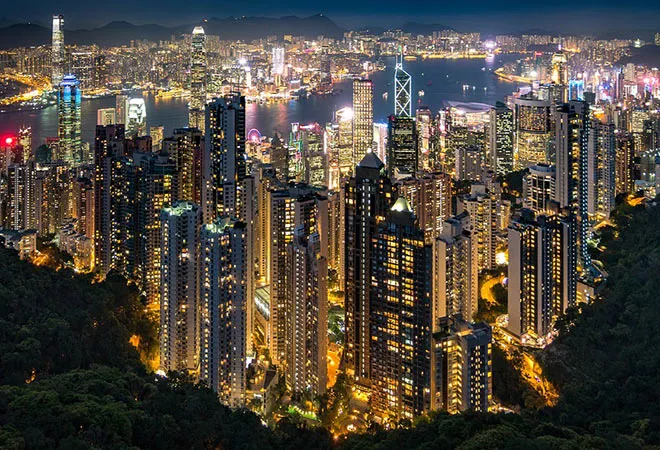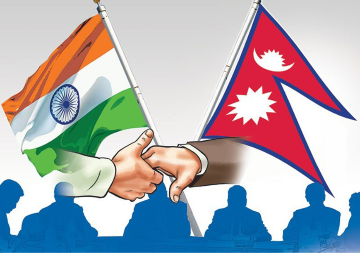
On 23 October 2019, Hong Kong authorities formally withdrew the draft extradition bill that had lead to widespread political turmoil in the region. With protests entering their 20th week, violence has continued unabated on both sides with protestors using bricks and petrol bombs, and the police, responding in kind, with tear gas, rubber bullets and water cannons.
Unfortunately, the withdrawal of the bill has failed to achieve the desired effect; the protestors want the Hong Kong administration to accept all their five demands which includes (apart from withdrawing the bill) an independent inquiry into police misconduct, amnesty for arrested protestors, not characterising protests as riots, and restarting electoral reforms. The demands point towards deep-seated issues pertaining to the relationship between Hong Kong and China, and the inability of the existing “one country, two systems” to grant legal and political autonomy as desired by the citizens of Hong Kong.
Explaining the “One Country, Two Systems”
Hong Kong was a colony of the British Empire, and served as its port city for over 150 years. Consequently, it developed broadly different economic and administrative systems, along with societal and cultural differences between its citizens and those of China. With both regions going through distinct historical developments, Beijing adopted socialist leanings under the overarching control of the Communist party, while the Hong Kong region practiced a laissez faire economy, with a relatively liberal approach to governance and decision-making.
With the aim to unify such former colonies without eroding their autonomy, Deng Xiaoping, China’s then paramount leader, proposed the principle of “one country, two systems” (OCTS). The principle enables the co-existence of different social, political and legal systems within a unitary country and is implemented in the Macau territory as well.
Through the 1984 Joint Declaration, the United Kingdom relinquished control over Hong Kong, and China officially resumed sovereignty over it from 1 July 1997. The Declaration is a legally binding international treaty registered with the United Nations, and adopts the OCTS principle. Under the treaty, Hong Kong was to be established as a special administrative region and the socialist systems and policies of China were not to be practiced here. The region was to enjoy a “high degree of autonomy”, except in “foreign and defence affairs”, which would be part of Beijing’s responsibilities. The existing “social and economic systems” were to remain unchanged, and the “life-style” of the people of Hong Kong was to be preserved.
The finer details of the constitutional relationship between China and Hong Kong is laid down in the “Basic law” and prescribes the systems to be practiced in the HKSAR. It is described as an “inalienable part” of China that enjoys “executive, legislative and independent judicial power, including of final adjudication”. The region has autonomy in areas of finance, economy, trade, development, transport and communications. It can maintain and develop relations and, conclude and implement agreements with foreign states, regions and relevant international organisations in various areas. Hong Kong has its own flag, stamps and currency, and can also issue passports and determine its own immigration policies.
The basic law also guarantees various fundamental rights and duties to its citizens, such as the freedom of speech, press, association, movement, privacy of communication, among others. Though China’s own constitution guarantees these rights as well, it does not have an independent and recognisable regime to enforce them. On the other hand, Hong Kong’s independent judiciary has helped in enforcing and protecting these rights, thereby creating a vigorous and active civil society.
Institutional weakness and restrictions on autonomy
However, autonomy and constitutional guarantees can be effective only if they are supported by robust institutional mechanisms and the rule of law. For many, an important element for autonomy and “self-rule” is the direct election of representatives who can put forth the cause of the Hong Kong region before the Mainland government. Thus, one of the five demands of the protestors has been genuine political reform to achieve universal suffrage.
Currently, Hong Kong’s Chief Executive is appointed by the PRC (People’s Republic of China) government in consultation with a “broadly representative” election committee, comprising of members from industries, commercial and financial sectors, and other professions. According to popular opinion, this method ensures that the appointed Chief Executive is one who favours the interests of Beijing over those of Hong Kong’s own residents. Since neither the 1984 Joint Declaration nor the Basic Law specify a method for appointment, Beijing has been given sufficient maneuverable space to frame a method that keeps out popular, democratic nominees. Nonetheless, Article 45 of the Basic Law promises that the “ultimate aim” is to achieve “universal suffrage” in the appointment method, but mentions that this change depends upon the “actual situation of Hong Kong”.
A similar issue plagues Hong Kong’s Legislative Council (“LegCo”), which has the power to draft and enact laws for the region. Representatives to this body are not directly elected either; in fact, the process is designed to induct privileged business and professional groups and minimise the role of independent political parties. Here too, Article 68 of the Basic Law promises to achieve “universal suffrage” sometime in the future.
Past events have, however, created doubts about achieving genuine political reform through universal suffrage. In 2014, the National People’s Congress Standing Committee (NPC Standing Committee) issued a decision that imposed a complicated system for vetting candidates, and included a pre-condition that the candidate for chief executive “must love the country and love Hong Kong”. The public viewed this clause as a means to exclude candidates from the popular pan-democratic camp, and ensure that only pro-Beijing supporters were appointed. This led to months of protests and political turmoil, now referred to as the “Umbrella movement”.
Hong Kong’s judiciary is a stronger and independent institution, in comparison with the executive and the legislature. Under Article 158 of the Basic Law, both the Hong Kong judiciary and the NPC Standing Committee have concurrent powers to interpret the Basic Law. However, when it comes to interpreting provisions pertaining to the relationship between Hong Kong and China, the NPC Standing Committee stands in a superior position and is deemed to be the ultimate authority. This was established very clearly in the aftermath of the Ng Ka Ling v. Director of Immigration case, where the final decision of Hong Kong’s courts was seen to override China’s sovereign interests, and thus, was eventually overturned by the NPC Standing Committee. This is a corollary of the fact that the Basic Law is a document enacted by China and not by Hong Kong, and for Beijing, any changes to the same should come from it alone.
Conclusion
To varying extents, Hong Kong’s executive, legislature and judiciary are subordinate to those of Mainland China. This is not unusual to the grand scheme of the OCTS; “one country” is the leading principle of this arrangement. Where the OCTS does remain weak is in accommodating and reconciling the “two systems” by guaranteeing sufficient legal and political autonomy to Hong Kong. The weakness of institutions in Hong Kong coupled with the overarching control exercised by Beijing, has limited the establishment of participatory and accountable institutions, thereby rolling back the promise of “autonomy”. With efforts to keep out independent political parties from all aspects of governance, frustrations among the citizens of Hong Kong run high and manifest in the form of protests, time and again. Hong Kong’s autonomy under the “one country, two systems” appears to be a means to an end; it aims to facilitate a capitalist economy, rather than ensuring democracy and social justice.
While Beijing is reluctant to cede more space to Hong Kong, retaining the status quo may only lead to further instability in the region. The solution for China would be to revisit the guiding principles of the OCTS, and reevaluate the structure and form of autonomy given to Hong Kong’s citizens.
The views expressed above belong to the author(s). ORF research and analyses now available on Telegram! Click here to access our curated content — blogs, longforms and interviews.




 PREV
PREV


